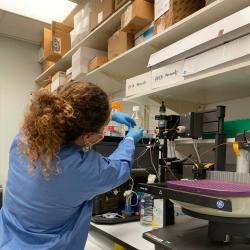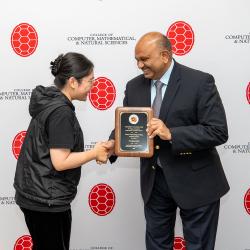NSF Graduate Research Fellowships Awarded to 10 Science Terps
Awardees include two current undergraduate students and eight recent alumni, one of whom is a current CMNS graduate student
Ten current students and recent alumni of the University of Maryland’s College of Computer, Mathematical, and Natural Sciences (CMNS) received prestigious National Science Foundation (NSF) Graduate Research Fellowships, which recognize outstanding graduate students in science, technology, engineering, and mathematics.
“The NSF Graduate Research Fellowships are highly competitive,” said CMNS Dean Amitabh Varshney. “It is gratifying to see our students recognized at this level for their dedication to their discipline and their commitment to using their knowledge to advance society.”
Across the university, five undergraduates and 17 recent alumni were among the fellowship winners announced by the NSF. As a result, UMD ties for 13th in the nation and ranks second in the Big Ten for the number of fellows who received their bachelor’s degrees at the university. In addition, seven current graduate students at UMD received the awards.
The 10 awardees that hail from CMNS include two current undergraduate students and eight recent alumni—one of whom is a current CMNS graduate student—who received bachelor’s degrees in CMNS majors.
CMNS graduate student fellowship recipient:
- Philip Johnson (B.S. ’18, biological sciences, B.S. ’18, computer science), biological sciences, undergraduate institution: University of Maryland
CMNS undergraduate student fellowship recipients:
- Joseph Breeden, dual degrees in mathematics and aerospace engineering
- Aaron George, dual degrees in computer science and mathematics
CMNS alumni fellowship recipients:
- Tylar Clark-Winters (B.S. ’18, chemistry; B.S. ’18, environmental science and technology), graduate institution: Johns Hopkins University
- Yevgeniy Froimchuk (B.S. ’16, biochemistry and biological sciences), graduate institution: University of Maryland
- Junellie Gonzalez Quiles, (B.S. ’18, astronomy), graduate institution: Johns Hopkins University
- Brandon Grinkemeyer (B.S. ’18, physics), graduate institution: TBD
- Arec Jamgochian (B.S. ’16, physics; B.S. ’16, mechanical engineering), graduate institution: Stanford University
- Caitlyn McCafferty (B.S. ’15, chemistry), graduate institution: University of Texas at Austin
- Rishabh Sharan (B.S. ’17, biological sciences; B.S. ’17, computer science), graduate institution: Princeton University
NSF fellows receive three years of support from the agency, including a $34,000 annual stipend, a $12,000 cost-of-education allowance to the graduate degree-granting institution, international research and professional development opportunities, and access to a supercomputer.
The NSF Graduate Research Fellowship Program helps ensure the vitality of the human resource base of science and engineering in the United States and reinforces its diversity. The program recognizes and supports outstanding graduate students in NSF-supported science, technology, engineering, and mathematics disciplines who are pursuing research-based master’s and doctoral degrees at accredited U.S. institutions.
Since 1952, NSF has funded more than 50,000 Graduate Research Fellowships out of more than 500,000 applicants. Currently, 42 fellows have gone on to become Nobel laureates, and more than 450 have become members of the National Academy of Sciences.
###
Media Relations Contact: Irene Ying, 301-405-5204, zying@umd.edu
University of Maryland
College of Computer, Mathematical, and Natural Sciences
2300 Symons Hall
College Park, MD 20742
www.cmns.umd.edu
@UMDscience
About the College of Computer, Mathematical, and Natural Sciences
The College of Computer, Mathematical, and Natural Sciences at the University of Maryland educates more than 9,000 future scientific leaders in its undergraduate and graduate programs each year. The college’s 10 departments and more than a dozen interdisciplinary research centers foster scientific discovery with annual sponsored research funding exceeding $175 million.







